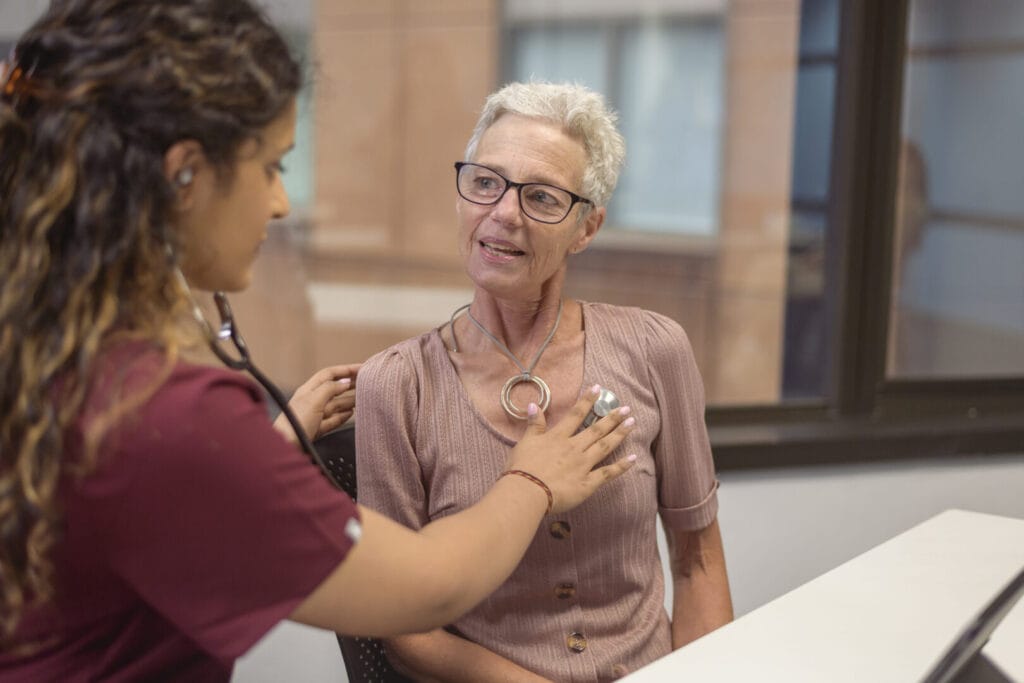Maintaining heart health is vital for living a long and fulfilling life, especially for older adults. As we age, our hearts become more susceptible to conditions like high blood pressure, heart disease, and stroke.
According to the American Heart Association, nearly 80% of people aged 65 and older are battling with at least one form of cardiovascular disease. The risk of heart disease, including coronary artery disease and heart failure, markedly increases with age, with individuals over 65 accounting for more than 70% of all heart failure cases in the U.S.
Family caregivers play an essential role in helping their elderly loved ones maintain heart health through lifestyle adjustments, regular check-ups, and managing medications. Hence, we offer the following indispensable advice aimed at enhancing the heart health of the seniors in our care:
- Nutrition for a Healthy Heart
- Stay Active, Stay Healthy
- Managing Stress and Mental Well-being
- Regular Check-ups and Screenings
- Social Connections and Heart Health
- Medication Management
Nutrition for a Healthy Heart
A balanced diet rich in heart-healthy nutrients is key for seniors. Numerous studies have shown a strong link between healthy dietary patterns and a reduced risk of cardiovascular disease (CVD). For example, a 2023 meta-analysis found that adherence to a Mediterranean diet was associated with a 25% lower risk of coronary heart disease.
- Foods high in omega-3 fatty acids, fiber, and antioxidants are particularly beneficial. Including a variety of fruits, vegetables, whole grains, and lean proteins can significantly impact a senior's heart health.
- Limiting the intake of saturated fats, sodium, and sugars is also crucial in preventing heart-related issues. Caregivers can support their loved ones by preparing nutritious meals and encouraging healthy eating habits.
- Balancing the intake of various nutrients is vital for seniors' overall health and especially for their heart. This involves ensuring a diet that provides a good mix of vitamins, minerals, proteins, carbohydrates, and healthy fats.
- Paying attention to portion sizes and the frequency of meals can help maintain an optimal balance. Introducing a variety of nutrient-dense foods into the diet ensures that seniors get all the necessary nutrients without excessive calorie intake.
Hydration and heart health
Hydration plays a crucial role in maintaining heart health. Adequate fluid intake helps the heart pump blood more easily through the blood vessels to the muscles. It also aids in maintaining proper electrolyte balance, which is essential for heart function. For seniors, staying well-hydrated is especially important as their bodies are less able to conserve water, and they may not feel thirsty until dehydration has set in.
Caregivers can help by offering water, fruit-infused water, or other hydrating beverages throughout the day. Monitoring the color of urine can also be a practical way to ensure adequate hydration; clear or light yellow urine typically indicates good hydration.
Stay Active, Stay Healthy
Physical activity is paramount for seniors when it comes to maintaining heart health. Regular exercise helps in managing weight, lowering blood pressure, and reducing the risk of heart disease. Even moderate activities like walking, swimming, or yoga can have significant benefits. Caregivers should encourage and facilitate daily physical activity for seniors, ensuring that the exercises are safe and enjoyable for their level of mobility and health conditions.
Tailored physical activities for older adults
Not all exercises are suitable for every senior, especially considering varying health conditions and mobility levels. Tailored physical activities may include:
- Low-Impact Aerobics: Activities like walking or swimming that are gentle on the joints.
- Strength Training: Using light weights or resistance bands to maintain muscle strength and support joint health.
- Balance Exercises: Practices like Tai Chi or simple standing balance exercises to prevent falls.
- Flexibility Exercises: Stretching or yoga to improve mobility and reduce muscle stiffness.
It's important for caregivers to consult with healthcare professionals to determine the most suitable exercises for their elderly loved ones.
Managing Stress and Mental Well-being
The mental health of seniors is just as important as their physical health, especially when it comes to heart health. Chronic stress can lead to high blood pressure, which is a risk factor for heart disease. Caregivers can play a crucial role in managing and reducing stress in the lives of seniors. This includes creating a calm environment, encouraging open communication, and providing emotional support.
Stress-reduction techniques for seniors
Several techniques can help seniors manage stress effectively:
- Mindfulness and Meditation: Practices that encourage staying present and reducing anxiety.
- Deep Breathing Exercises: Techniques like diaphragmatic breathing that promote relaxation.
- Engaging in Hobbies: Activities like gardening, painting, or knitting can be therapeutic.
- Social Interactions: Maintaining connections with friends and family can greatly reduce stress levels.
The connection between mental health and heart health
There is a significant connection between mental health and heart health. Stress, anxiety, and depression can all have adverse effects on the heart. They can lead to unhealthy habits like poor diet, lack of exercise, and substance abuse, which are detrimental to heart health. Addressing mental health is, therefore, a critical part of caring for a senior’s heart.
Regular Check-ups and Screenings
Regular health check-ups and screenings are essential for senior heart health. These appointments allow for early detection and management of potential heart issues. Caregivers should ensure that seniors are keeping up with their routine doctor visits, which may include blood pressure monitoring, cholesterol checks, and other heart-related screenings.
These assessments can help identify risk factors such as hypertension, high cholesterol, or diabetes, which are controllable with early intervention. Regular visits to a healthcare provider also offer an opportunity to discuss any concerns and adjust treatment as needed.

Screening tests for early detection of heart issues
Several screening tests are crucial for early detection of heart issues in seniors:
- Blood Pressure Measurements: To monitor hypertension, a major risk factor for heart disease.
- Cholesterol Level Check: High levels of bad cholesterol can lead to heart disease.
- Electrocardiogram (ECG or EKG): To detect irregular heart rhythms or heart damage.
- Stress Testing: To observe the heart's activity during physical exertion.
- Echocardiogram: An ultrasound of the heart to assess its structure and function.
Caregivers should coordinate with healthcare providers to ensure these tests are conducted as recommended.
Social Connections and Heart Health
Social connections have a profound impact on senior heart health. Isolation and loneliness can lead to depression and stress, adversely affecting heart health. Encouraging seniors to engage in social activities, whether through community groups, family gatherings, or even virtual meetups, can improve their emotional well-being and, in turn, benefit their heart health.
The role of socializing in senior well-being
Regular socializing helps seniors maintain a sense of belonging and purpose, which is beneficial for their mental and physical health. Activities like joining clubs, volunteering, or participating in group exercises not only provide social interaction but also promote physical activity, which is beneficial for heart health.
Medication Management
For seniors with heart conditions, proper medication management is critical. Caregivers should ensure that medications are taken as prescribed, understand the purpose and side effects of each medication, and keep regular appointments with healthcare providers to review the medication regimen. Proper management helps in controlling the conditions that affect heart health, like hypertension and high cholesterol.
The importance of adhering to prescribed medications
Adherence to prescribed medications is vital in managing heart-related conditions. Missing doses or incorrect usage can lead to ineffective treatment and increased health risks. Caregivers can aid by setting reminders, organizing medications, and keeping an updated list of all prescriptions.
National Wear Red Day® and American Heart Month
National Wear Red Day, observed on February 2, 2024, is an important event to raise awareness about heart disease, particularly in women. Participating in this event by wearing red can help spread awareness and show support for heart health initiatives.
American Heart Month is a significant time to focus on heart health. It's an opportunity for caregivers and seniors to learn more about heart disease prevention and to participate in community events promoting heart health.
Recap of Heart Health for Seniors
To conclude, let's recap the key heart-healthy habits for seniors:
- Maintain a balanced diet rich in heart-healthy nutrients.
- Stay hydrated and manage fluid intake.
- Engage in regular physical activity tailored to mobility levels.
- Prioritize mental well-being and manage stress.
- Keep up with regular health check-ups and screenings.
- Foster social connections and avoid isolation.
- Adhere strictly to prescribed medications.
- Participate in heart health awareness events.
By embracing these heart-healthy habits and integrating them into the daily routines of seniors, caregivers can make a significant difference in their quality of life and longevity. Your dedication and efforts in nurturing a heart-healthy environment for seniors not only contribute to their physical health but also to their overall happiness and well-being.





